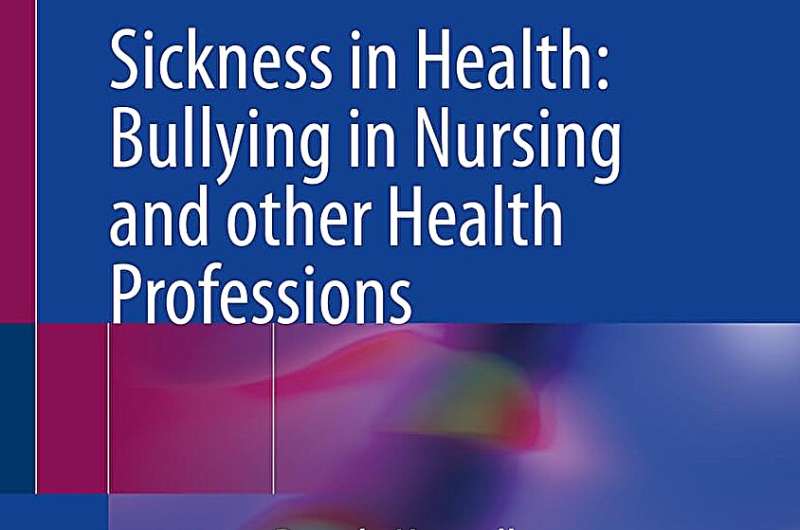
Credit: Springer International Publishing AG
Healthcare professionals are caring people. So they must be great colleagues, right? Not so, according to Brenda Happell, a professor of mental health at Southern Cross University, who reflects on her own experiences of bullying in a new book.
Happell’s successful career as a mental health nurse ended abruptly when she gave up her beloved work in favor of her physical and mental health.
“It broke my heart when I left, when and how I did it. I just couldn’t take it anymore. I had to go. I felt like my life depended on it,” she said.
Despite more than four decades of experience in healthcare and academic settings, Professor Happell quickly discovered that the impact of bullying does not go away once she leaves a toxic environment. She knew she could not heal until she could make some sense of her experiences.
Her book “Sickness in Health: Bullying in Nursing and Other Health Professions” was the result of her determination to share her experiences of workplace bullying. Knowing she wasn’t alone, she sought out other healthcare professionals—in medicine, nursing, social work, psychology, and more—who were willing to share their stories with her.
“These 12 people, who I call champions, have shared so much with me. It was painful to hear what happened to them and what is still happening to some. Lives and relationships were destroyed. How can healthcare professionals behave like this? It still baffles me to this day,” said Professor Happell.
This book goes beyond statistics to show how bullying derails careers and destroys lives. Professor Happell and “her champions” lost their love for the jobs that meant so much to them, lost confidence in their ability to do their jobs, and often believed they must have done something to deserve what happened. Some left their jobs or retired early to escape the torment.
As Professor Happell says in the book, “I loved my job. I loved the work, the variety, and the autonomy. The decision to leave was always difficult and meant giving up much that was satisfying.”
Jordan, a former nursing academic, expressed similar sentiments: “Work is such an essential part of what I do and who I am, that it’s just not an option to just rest on my laurels, do what I have to do and fade into the background.”
Understanding workplace bullying is not as simple as it seems. Not all bullies scream and yell. Subtle approaches are much more common. Micromanagement, changing goals, undermining, withholding resources, and imposing unreasonable work demands are just a few examples. These tactics can be much harder to identify.
As Taylor, a mental health peer worker, describes, “You can see the obvious, prepare for it, and take note of it, but it’s what you don’t see coming that will get you. That scares me even more.”
Collecting the anecdotes gave Professor Happell ample time to think.
“Why does bullying continue on such a scale? Surely there are structures in place where it can be addressed and resolved. Unfortunately, this is not the case and certainly not for the champions,” said Professor Happell.
Rory, a doctor, put it beautifully:
“If you don’t have a good culture and strong leaders who pull these people aside and say, ‘This isn’t good enough here,’ it can happen anywhere in any workplace. People don’t get management training. They’re just put into these positions.”
“Nowhere to turn,” is how many described their feelings amid the bullying storm. They had tried to resolve bullying informally through direct communication or, more formally, through human resources (HR) departments and unions. This not only did not help. It led to more bullying, exclusion and often ostracism.
“There are very few people I know who have had a favourable resolution from HR. It is clear that they are there to support management. If you are bullied by management, you have no hope,” said Professor Happell.
This clearly points to broader organizational structures that at best condone these practices and at worst encourage them.
“Everything we know about workplace bullying in healthcare points to toxic working environments, unqualified and often inappropriate managers, HR departments that support management and unions that appear powerless,” said Professor Happell.
“How can professionals work safely and effectively in these conditions? They can’t. We hear time and time again about the shortage of healthcare professionals. When are we going to stop eating our young and not so young? Something has to be done. Not just for healthcare professionals, but for the public who rely on healthcare services, and sometimes their lives depend on it.”
Sadly, this book does not have a happy ending. Professor Happell hopes that it will help healthcare professionals to recognise the signs of bullying and the need to support themselves and their colleagues. Others will hopefully see that they are not alone and are not to be blamed.
Professor Happell hopes above all that “it contributes to conversations and helps change our understanding of bullying.”
More information:
Illness and health: bullying in nursing and other health professions. link.springer.com/book/10.1007/978-3-031-49336-2
Quote: Sickness in health care: when workplace bullying turns colleagues into enemies (2024, August 19) Retrieved August 19, 2024 from https://medicalxpress.com/news/2024-08-sickness-health-workplace-bullying-colleagues.html
This document is subject to copyright. Except for fair dealing for private study or research, no part may be reproduced without written permission. The contents are supplied for information purposes only.
 Healthy Famz Healthy Family News essential tips for a healthy family. Explore practical advice to keep your family happy and healthy.
Healthy Famz Healthy Family News essential tips for a healthy family. Explore practical advice to keep your family happy and healthy.


